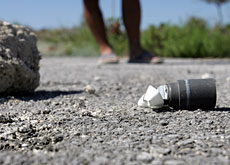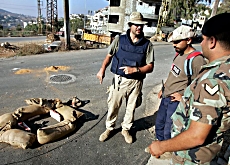Cluster bomb ban remains unclear

Nearly 70 countries including Switzerland have pledged support for an international ban on cluster bombs, but still don't know how to implement it.
Swiss delegates at a conference in the Peruvian capital Lima said that nations could not reach a consensus this week on just what constitutes this type of munition.
“We could not agree on a definition of what is a cluster bomb and therefore on what should be banned,” added the head of the Swiss delegation, Daniel Klingele.
According to Klingele, Switzerland’s aim by supporting a ban is to reinforce humanitarian law and to better protect civilians during armed conflict.
Non-governmental organisation Handicap International has however criticised the Swiss government’s position on cluster bombs.
Earlier this month, the cabinet said it favoured a partial moratorium, adding that a full one was “excessive”.
This would effectively apply to the production, stockpiling, transfer and use of such weapons that present a strong threat to humans.
Handicap International’s Swiss section slammed the move as a “balancing act,” leaving the door open to maintaining the country’s arsenal of cluster bombs.
Switzerland is not alone. Some nations, mostly European countries that produce cluster bombs, have pushed for a compromise that would exempt certain munitions from a ban – for example if they contained self-destruct mechanisms or had a proven reliability rate.
Blanket ban demanded
Campaigners against these munitions say only a blanket ban would do. But while there is still no agreement on what constitutes a cluster bomb, NGOs such as Handicap International reckon some progress was made in Lima.
The head of Handicap’s Swiss section, Paul Vermeulen, said the signs were encouraging.
“Governments are starting to take us seriously now,” he added. “We have reached the point where we can all clearly express our opinions and see what we agree and disagree on.”
The Lima conference brought together representatives of 68 countries to broaden support for a declaration agreed in Norway in February. But the world’s biggest producers of the munitions, the United States, Russia and China, were not among them.
When cluster bombs explode, they scatter numerous bomblets that often lie dormant, exploding only when unsuspecting civilians pick them up, sometimes years after they were dropped.
Campaigners say the vast majority of victims are civilians and about a quarter are children.
The next scheduled meeting is in Vienna in December where organisers hope to gain support from more countries.
swissinfo with agencies
Cluster bombs were first used by the Soviets against German troops during the Second World War.
Global stockpile: four billion in 75 countries, one quarter in US hands.
35 countries produce or produced cluster bombs.
Civilians – around 11,000 people – are the vast majority of victims of these munitions, a quarter of them children.
No international treaty, including the Geneva Conventions, specifically forbids the use of cluster bombs.
However, the Geneva Conventions outline laws protecting civilians during conflict. Because cluster bomblets often cause civilian casualties after conflicts end – much like landmines – their use has been heavily criticised by human rights groups.
In Switzerland, parliament will discuss a ban on the weapons in June after an initiative put forward last year by a Radical member of the House of Representatives, John Dupraz. The Swiss army has 200,000 such weapons.

In compliance with the JTI standards
More: SWI swissinfo.ch certified by the Journalism Trust Initiative











You can find an overview of ongoing debates with our journalists here . Please join us!
If you want to start a conversation about a topic raised in this article or want to report factual errors, email us at english@swissinfo.ch.